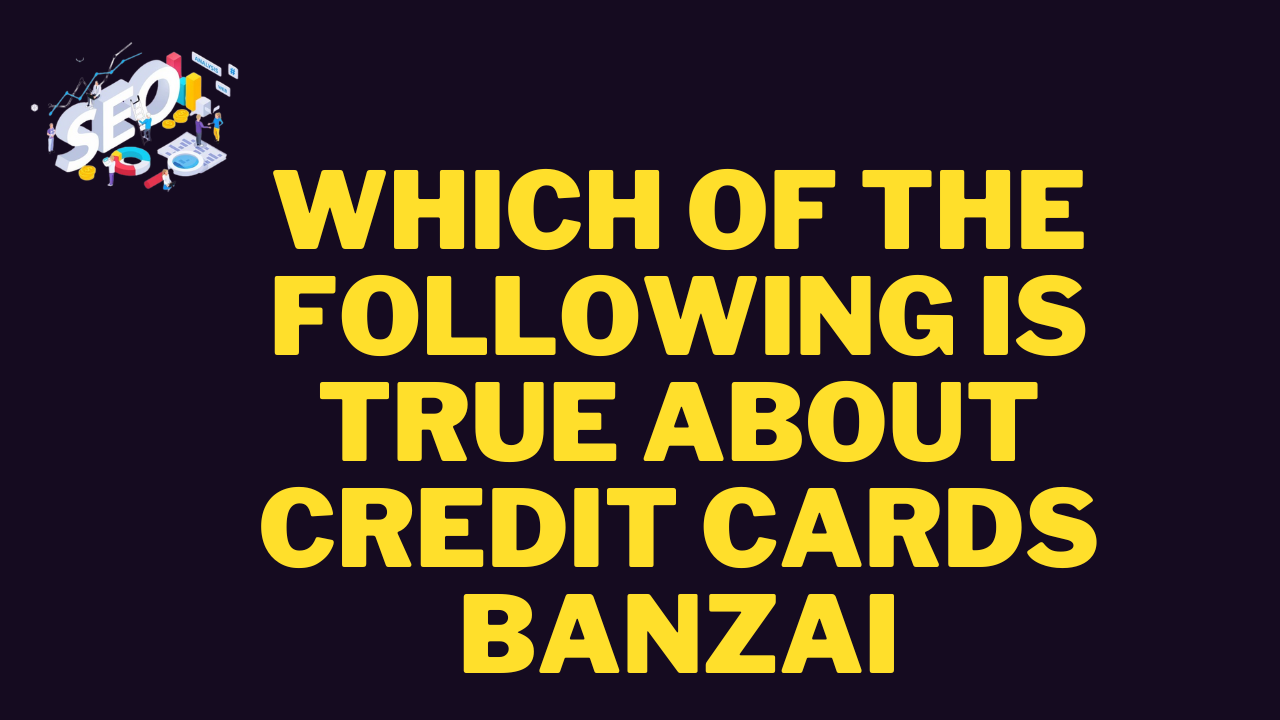Introduction:
Credit cards have become an integral part of modern-day financial transactions. Whether purchasing goods online, booking travel tickets, or paying for everyday expenses, credit cards offer convenience and flexibility like no other form of payment. However, with the myriad of options available and the potential pitfalls associated with their misuse, understanding credit cards is crucial for financial well-being. This comprehensive guide will delve into the world of credit cards, covering everything from their basics to advanced strategies for responsible usage.
Understanding Credit Cards:
At its core, a credit card is a financial tool that allows users to borrow money from a financial institution up to a predetermined limit. Unlike debit cards, which deduct funds directly from a linked bank account, credit cards provide a line of credit that must be repaid within a specified period, usually every month. This borrowed amount incurs interest if not paid in full by the due date.
Types of Credit Cards:
Credit cards come in various types, each catering to different needs and lifestyles. Some common types include:
Rewards Credit Cards: These cards offer rewards, such as cashback, travel miles, or points, based on the amount spent using the card.
Balance Transfer Credit Cards: Designed to help users consolidate debt, these cards allow to transfer balances from other credit cards at lower interest rates.
Secured Credit Cards: Geared towards individuals with limited or poor credit history, secured credit cards require a security deposit, which serves as collateral.
Business Credit Cards: Specifically tailored for business expenses, these cards offer perks such as higher credit limits and rewards on business-related purchases.
Key Features and Terms:
To make informed decisions about credit cards, it’s essential to understand their key features and associated terms. These may include:
Annual Percentage Rate (APR): The annualized interest rate charged on outstanding balances.
Credit Limit: The maximum amount a cardholder can borrow on a credit card.
Minimum Payment: The lowest amount a cardholder must pay monthly to maintain the account in good standing.
Grace Period: No interest is charged on purchases if the balance is paid in full by the due date.
Fees: Various fees may apply, including annual fees, late payment fees, and foreign transaction fees.
Benefits of Using Credit Cards:
When used responsibly, credit cards offer several advantages, including:
Convenience: Credit cards are convenient, especially for online and in-person transactions.
Rewards: Many credit cards offer rewards such as cashback, travel miles, or points, providing additional value for cardholders.
Build Credit History: Responsible credit card usage can help individuals build a positive credit history, which is crucial for future loan approvals.
Purchase Protection: Some credit cards offer purchase protection, including extended warranties and fraud protection, providing peace of mind to cardholders.
Managing Credit Card Debt:
While credit cards offer numerous benefits, they can also lead to debt if not managed responsibly. To avoid falling into debt traps, consider the following strategies:
Pay in Full: Whenever possible, pay the credit card balance in full each month to avoid accruing interest charges.
Monitor Spending: Keep track of your spending and stay within your budget to avoid overspending.
Avoid Minimum Payments: While minimum payments may seem convenient, they can lead to long-term debt due to accruing interest.
Utilize Rewards Wisely: Make the most of credit card rewards but avoid overspending solely to earn rewards.
Credit cards are powerful financial tools that offer convenience, flexibility, and rewards when used responsibly. By understanding their features, terms, and potential pitfalls, individuals can make informed decisions and harness the benefits of credit cards while avoiding common pitfalls such as debt accumulation. With proper management and responsible usage, credit cards can serve as valuable assets in achieving financial goals and enhancing overall economic well-being.
Managing Credit Card Debt:
Paying off credit card debt can be a challenging task, but with careful planning and discipline, it is definitely achievable. One effective strategy is to prioritize your debts based on interest rates. Begin by making minimum payments on all your cards, and then allocate any additional funds towards the card with the highest interest rate. By doing so, you will gradually reduce the amount of interest you owe, helping you get out of debt more efficiently.
Another helpful tip is to avoid accumulating further debt while trying to pay off your existing balance. It is crucial to resist the temptation of using your credit cards for unnecessary expenses. Instead, focus on setting a realistic budget and cutting back on non-essential spending. This way, you can ensure that you are directing as much money as possible towards paying off your debt and making significant progress in reducing it.
• Prioritize your debts based on interest rates
• Make minimum payments on all cards
• Allocate any additional funds towards the card with the highest interest rate
• Gradually reduce the amount of interest you owe
• Avoid accumulating further debt while paying off existing balance
• Resist temptation to use credit cards for unnecessary expenses
• Set a realistic budget and cut back on non-essential spending
• Direct as much money as possible towards paying off debt
• Make significant progress in reducing debt

How can I manage my credit card debt effectively?
There are several strategies you can use to manage your credit card debt effectively. Some options include creating a budget, paying more than the minimum payment, negotiating lower interest rates, and considering debt consolidation.
What is the best way to create a budget to manage credit card debt?
To create a budget, start by listing all your income sources and expenses. Prioritize your debt payments and allocate a certain amount each month towards paying off your credit card debt. Adjust your spending habits to align with your budget and avoid unnecessary expenses.
Should I pay more than the minimum payment on my credit card?
Yes, paying more than the minimum payment is highly recommended. By paying only the minimum, you will primarily be covering interest charges, which can prolong your debt repayment period. Aim to pay as much as you can afford each month to accelerate your debt payoff.
How can I negotiate lower interest rates on my credit cards?
You can try contacting your credit card issuer and requesting a lower interest rate. Highlight your positive payment history and loyalty as a customer. If they refuse, consider transferring your balance to a card with a lower interest rate or exploring options with a credit counseling agency.
What is debt consolidation and should I consider it?
Debt consolidation involves combining multiple debts into a single loan or credit card with a lower interest rate. This can make it easier to manage your debt and potentially save money on interest. However, carefully evaluate the terms and fees associated with any consolidation option before proceeding.
Will closing unused credit cards help with managing credit card debt?
Closing unused credit cards can impact your credit utilization ratio, potentially lowering your credit score. It is generally advisable to keep unused cards open to maintain a healthy credit history. However, if having the cards tempts you to spend more, it may be beneficial to close them.
What are some additional tips for managing credit card debt?
Other tips for managing credit card debt include avoiding new debt, seeking professional advice if needed, tracking your expenses, and considering a side job or selling unused items to increase your debt repayment capability. It’s important to develop a personalized strategy that works for your financial situation.

